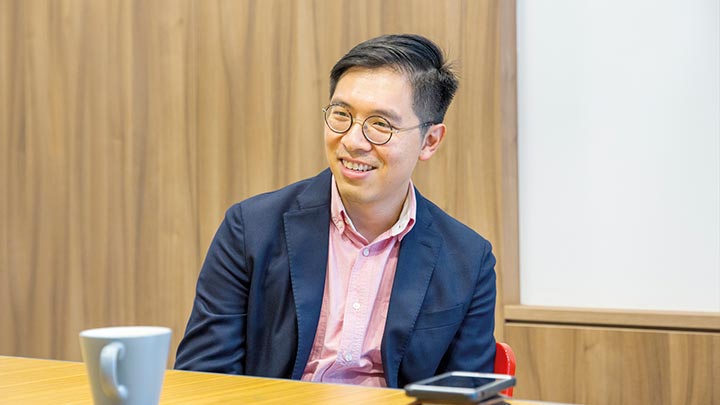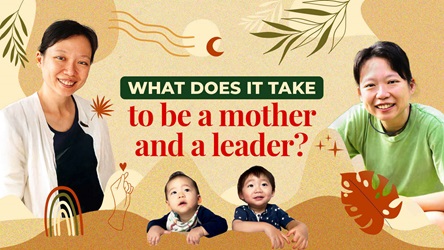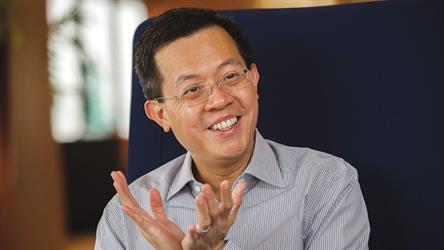Growing Through Asking

When in doubt, ask. Mr Chng Kai Fong learnt the value of this during his first posting at what was then the Ministry of Information, Communication and the Arts. He needed advice on his next career move and requested for 30 minutes of time from his then-Deputy Secretary. What he got was an hour, a frank observation of his strengths and weaknesses, and a phone call that would lead to him meeting his next boss.
Opening up to ask for help is not a weakness, says Mr Chng. It means you are aware of your own failings, and shows humility and courage. Seeking guidance from others can benefit one personally and professionally, with the added benefit of creating and strengthening relationships.
“Who remembers you more,” he poses, “the person you have helped or the person whom you’ve asked for help? It’s the person whom you have asked for help, because he or she is invested in you.”
Being bold
Before his appointment as Managing Director of the Economic Development Board (EDB), Mr Chng served in various roles in the Public Service, including as Principal Private Secretary to Prime Minister Lee Hsien Loong.
Along the way, he has never been afraid to continue asking: for advice, for experiences or for anecdotes. Many of these lessons and stories he has woven into speeches, including several memorable ones written for PM Lee.
This receptiveness is part of a mindset and spirit that Mr Chng strives to achieve for the EDB, one of authenticity, awareness and audacity – particularly as the organisation enters its next phase of transformation.

The next phase of growth for the EDB is to expand and enhance the organisation’s core competency of building one-on-one relationships. The EDB will strengthen these relationships by taking a more strategic and long-term role, such as by engaging companies more regularly about their 10-year plans and top priorities to see where Singapore can fit in.
There are also plans to engage smaller companies and start-ups, as well as help companies create new businesses in and with Singapore. “The EDB has a vast network, we speak with companies of every kind,” Mr Chng says. “Because we span multiple industries, and we meet different partners, we can find new opportunities and co-invest in something together.”
Learn, look, leap and love
For this to happen, Mr Chng highlights four important dangers to overcome.
The first, he says, is to think “we have arrived” or that “we can only learn from developed countries”. Officers will need to be humble and seek out pockets of excellence everywhere. “If you go to India, some of their hospitals are the best in the world,” he points out. “In Chile, some charter schools are worth learning from because they do so much with so little.”

Secondly, this learning from others must be coupled with a willingness to explore all opportunities – even past ones. Industries such as agriculture are seeing a resurgence because of technology and other disruptive forces. “If we always have the mindset that we have done this before and it doesn't work, then we will not explore these opportunities. Learning and looking again is important.”
The third danger is not taking chances. Having the courage and conviction to make informed leaps, and taking a more “venture capitalist” approach as Mr Chng describes it, could yield great returns that far outweigh the risks.
Lastly, he notes that it is important not to lose sight of people’s passion for their work and organisation, and to keep reminding them – especially as change happens. Whenever he talks to people who have left the EDB, he says, they tell him they miss the friendships and sense of camaraderie that come with working towards a shared mission.
“There is something lofty about public service that we often forget,” Mr Chng says, “so those two factors make a difference in the kind of organisation we want to be.”
As for himself, Mr Chng attempts to overcome these pitfalls by developing his own leadership acumen. The hardest thing about being a leader, he says, is “trying to be yourself”. It is only natural to try to live up to one’s predecessor, he explains.
“You really want to be like him … but somehow you come to the realisation that you are your own special person. You bring to the job certain strengths and also certain weaknesses.”
So, while he thinks he is a blend of all his previous bosses and often reflects on what he has learnt from them, Mr Chng strives to be his own type of leader: one who is authentic, open to feedback and aware of his own weaknesses.
Importantly, he wants to be a leader who continues to motivate and remind officers at the EDB what they stand for, which is to create exciting job opportunities for the next generation of Singaporeans.
One way the EDB is doing this is by marketing Singapore internationally to businesses, in a partnership with the Singapore Tourism Board to build the “Passion Made Possible” brand.
Recalling an anecdote he wrote into a speech for PM Lee, Mr Chng tells the story of an engineer, the child of a gardener, who received a bursary that saw him through school. He later went to polytechnic, entered the petrochemical industry, obtained a Master’s degree and now works at a leading pharmaceutical multinational corporation. Recently, he accompanied his own son as the boy received an EduSave Merit Award.
This, Mr Chng says, is “an EDB story” about driving industry and jobs, and making lives better. “So generation after generation improves, and we always remind ourselves of that: the role that we play in individual Singaporeans’ lives. And that's how passion is made possible.”

What’s in your cuppa?
Single-origin filtered coffee, black
How often do you have it?
One in the morning that I make with a V60 filter, and two or three cups (piccolo latte) at The Glasshouse in CHIJMES
- POSTED ON
Nov 5, 2018
- TEXT BY
Sheralyn Tay
- PHOTOS BY
Norman Ng









